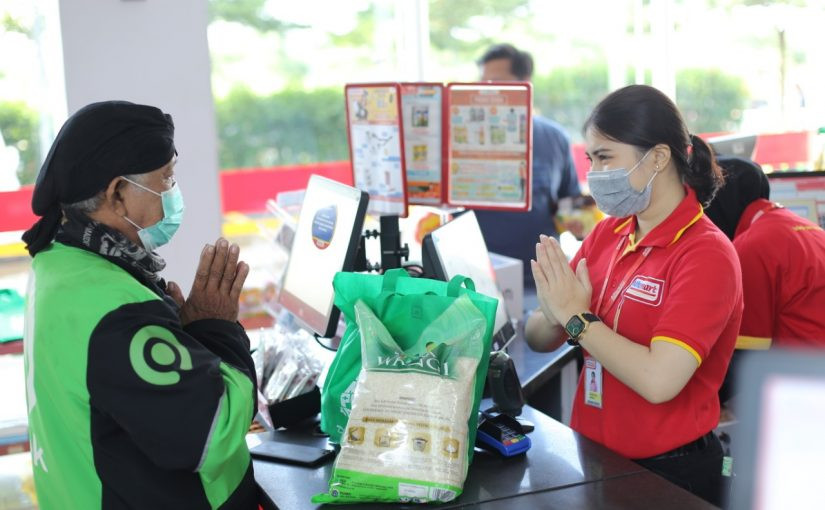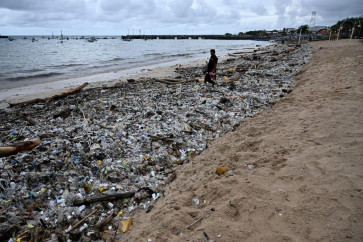Informal workers, jobs and digital platform potentials
A study on the increased use of digital labor platforms among informal workers during the pandemic indicates the need for policy development and improvement to accommodate this growing subsector.
Change text size
Gift Premium Articles
to Anyone

T
wo years have passed since the COVID-19 pandemic entered our collective experience, disrupting economies and the livelihoods of people around the world.
Strict social distancing, lockdown measures and falling demand have resulted in mass layoffs and pay cuts for formal workers worldwide. Meanwhile, the cut in working hours have threatened the livelihood of informal workers who depend on daily earnings.
In Indonesia alone, around 60 percent of the workforce, or as many as 78 million people, work in the informal sector across industries and jobs, from construction to trade, and from transportation to domestic services. Informal workers are employed in various ways: as direct hires with wages, day laborers and workers under multi-party employment, as well as work assignments through an agency or a platform.
Many informal workers, in particular those who live in urban areas, rely on digital labor platforms for their livelihoods. Under Indonesia’s employment system, workers that use digital labor platforms are considered self-employed. They are not entitled to certain employment rights, such as guaranteed salary, sick pay and protection from platform deactivation.
The pandemic has presented extraordinary challenges for platform workers in Indonesia. A study I conducted in 2020 on accessing informal work online during COVID-19 found that temporary social restrictions and a ban on passenger transportation led to a 70-80 percent decline in income for platform-based ojek (motorcycle taxis) in Jakarta, leaving many of them struggling to meet their basic needs.
On the other hand, a large proportion of platform-based domestic workers lost their jobs when GoLife, the on-demand lifestyle services arm of superapp Gojek, closed down operations in mid-2020. Most of the domestic workers that relied on the platform suffered at least a 90 percent decline in their incomes at the start of the pandemic.
Amid these challenges, platform workers sought to find other jobs through social media. Platform-based ojek drivers who were interviewed for the study resorted to bypassing digital platforms and advertising their services on Twitter, while domestic workers reached out to their former employers on WhatsApp. For many of these workers, their efforts allowed them to compensate for the loss of earnings and tide them over the economic shock until restrictions were eased.
However, the study also found that informal workers’ success in using social media to search for jobs was ultimately dependent on their online social networks and bound by the algorithms of social media platforms. Factors such as whether they had stayed in touch with former employers, the number of Twitter followers they had and retweets all played a role in enabling or limiting their online visibility.
The study also found that the use of social media to search for jobs among platform workers was fragmented by occupation and gender. While ojek demonstrated sophisticated digital skills in navigating social media platforms and using them to communicate with potential customers, domestic workers used social media to a much lesser extent due to limited digital skills and familiarity with most social media platforms. Female domestic workers in particular were reluctant to search for jobs on the internet outside of digital labor platforms, due to the lack of regulations and worker protection for domestic services.
Overall, most workers interviewed in the study faced challenges in transforming their social media job searches into a sustainable practice and returned to working via digital labor platforms once the COVID-19 restrictions were eased.
The study illustrates the heterogeneity that exists in the informal sector that has wider implications on the national digital transformation strategy lauded by the Indonesian government.
Firstly, while social media has allowed platform workers to bypass contact barriers and access markets, the digital divide remains a challenge for other informal workers. Past studies by global policy research network WIEGO, for example, found that most urban informal workers do not possess or know how to use a smartphone, nor do they have access to internet infrastructure.
Working via digital labor platforms requires informal workers to have a smartphone, since potential jobs are sent to them through a mobile app. However, this was not the case for the majority of the country’s 78 million informal workers who might be unprepared to use such technologies.
Increased understanding of the heterogeneity that exists in the informal sector and the different skills and qualifications of workers will allow the government to better understand the needs of informal workers and fine-tune any future assistance. Investing in digital skills development and infrastructure for informal workers can help them to diversify their employment opportunities and prevent worsening the digital divide between different social strata.
Secondly, the study highlights the preference of informal workers to continue working via digital labor platforms, as doing so negates the need to constantly search for jobs on their own. In the context of job insecurity and the countless protests held by platform workers in recent years, this preference further reflects the dearth of employment opportunities for a large segment of the Indonesian workforce.
With the emergence of new coronavirus variants and a slowly recovering economy, the challenge is in both creating alternative forms of employment and ensuring that workers can benefit equally from the labor markets attached to these platforms by extending the labor legislation to account for platform-based work. Only then can we start to build back better.
***
The writer is a doctoral candidate at the Warwick Institute for Employment Research in the United Kingdom. Her research primarily focuses on internet use and worker voice in the informal sector of the developing world. The study this article is based on has appeared in the International Labor Review and is to be published as part of the International Labour Organization’s special issue, “Covid-19 and the World of Work”.









